|
Belgium and the Winter Olympics (No.43)
12 February 2014
The Sochi Winter Olympics in Russia are heading towards their 6th day and are gradually reaching the climax. I am also glued to the TV watching the live broadcasting every day. Even though living now far away from Japan in Belgium, I am happy of the Japanese athletes’ performance in the games. Belgium has seven participants in the games, but has not yet won a medal. The long-track speed skater Bart Swings, who was expected to be among the top finishers, barely missed a medal by finishing 4th on the 5000 m. First of all, in the ninety year history of the Winter Olympics, Belgium has won only five medals. The only gold medal dates back to the 1948 Winter Games in St. Moritz in figure skating (pair dance). By the way, Japan has won 37 medals, including 9 gold medals and with 113 athletes participating in the Sochi Olympics, it is expected to get more medals. The previous Belgian medallist is Bart Veldkamp who was 3rd in speed skating at the Nagano Olympics in 1998, but his original nationality was Dutch. He acquired the Belgian nationality after failing to pass the representative selection. The Netherlands have won many medals, mainly in the field of speed skating, in the Winter Olympics, and the seven Belgian participants to the Sochi Olympics are all from the Dutch-speaking region Flanders. According to a local newspaper, there are no good training facilities for winter sports in Wallonia. However, as France is doing its best in the Winter Olympics, I hope that star athletes will appear from Wallonia in the future.
< Mechelen and Yuki City in Japan are Sister Cities >
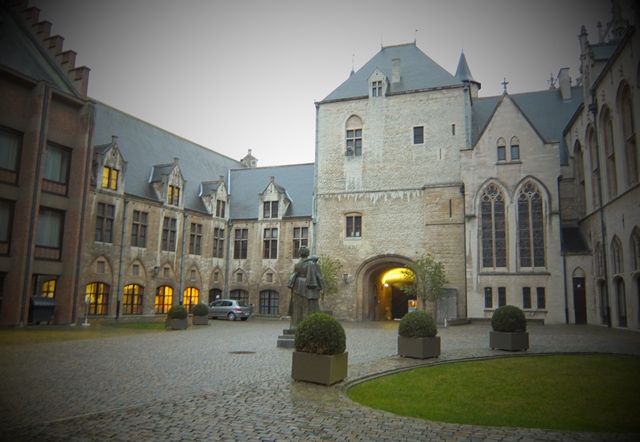 In the evening of the day before yesterday, I visited Mechelen (81,000 inhabitants), 30 km north of Brussels, and met with the mayor, Bart Somers. As Mechelen and Yuki City in Ibaraki Prefecture have been sister cities for 17 years, I talked to the mayor about the revitalization of exchanges between the cities. Mechelen was once the capital of the “low countries”, comprising Belgium and the Netherlands at the beginning of the 16th century under the rule of Austria. There still remains a lot of the ancient capital’s atmosphere even today. The city hall, which expresses the architectural style of those days, is a magnificent building. The construction of the Saint Rumbold’s Cathedral near the city hall started in the 13th century, was suspended in the beginning of the 16th century at a height of 97 m and stayed that way ever since. The majestic religious building is so compelling that its viewers are overwhelmed. Mechelen is also famous for its tapestry, which was the motive of the sister city relationship with Yuki City, famous for its pongee weavings. However, when returning home, the gift given to me from the mayor of Mechelen was … whisky. A local beer company started to produce whisky three years ago for the first time in Belgium. I am looking forward to taste it. In the evening of the day before yesterday, I visited Mechelen (81,000 inhabitants), 30 km north of Brussels, and met with the mayor, Bart Somers. As Mechelen and Yuki City in Ibaraki Prefecture have been sister cities for 17 years, I talked to the mayor about the revitalization of exchanges between the cities. Mechelen was once the capital of the “low countries”, comprising Belgium and the Netherlands at the beginning of the 16th century under the rule of Austria. There still remains a lot of the ancient capital’s atmosphere even today. The city hall, which expresses the architectural style of those days, is a magnificent building. The construction of the Saint Rumbold’s Cathedral near the city hall started in the 13th century, was suspended in the beginning of the 16th century at a height of 97 m and stayed that way ever since. The majestic religious building is so compelling that its viewers are overwhelmed. Mechelen is also famous for its tapestry, which was the motive of the sister city relationship with Yuki City, famous for its pongee weavings. However, when returning home, the gift given to me from the mayor of Mechelen was … whisky. A local beer company started to produce whisky three years ago for the first time in Belgium. I am looking forward to taste it.
< Belgium against France: Battle of the Supermarkets >
 It is impressive that a small country like Belgium, surrounded by the European powers, is doing so well economically, without being swallowed by these major countries. Of course, in the latter half of the 20th century the steel, automobile, electronics and glass industries became affiliated with all major Western corporations, but there remain plenty of competitive companies amongst the chemical, medical and bio industry. As labour cost is high, labour-intensive manufacturing is facing difficulties to survive, but nevertheless there are even internationally top class companies in the pioneering industry, in industries with high added-value and in niche industries. In this context, it deserves praise that two Belgian companies in the world of food supermarkets are not swallowed up by the French supermarket giant Carrefour, but are instead competing well with it. The day before yesterday, I visited one of those companies, the modern distribution centre of “Delhaize”. The huge distribution centre on the outskirts of Brussels was completed just a few years ago and is fully managed by computers. When an order is placed by a store, the system can deliver the goods to stores anywhere in Belgium within 3 to 9 hours. The temperature in the warehouse for fresh foods, which require maximum freshness, is constantly kept between 2 and 4 degrees. The highlight was to see the trays packed with various foods being conveyed freely on rails, up and down, left and right, within the facility. Dirk Van den Berghe, President of Delhaize Belgium, told me that mechanization was the only option in order to tackle Belgium’s high labour cost. It is impressive that a small country like Belgium, surrounded by the European powers, is doing so well economically, without being swallowed by these major countries. Of course, in the latter half of the 20th century the steel, automobile, electronics and glass industries became affiliated with all major Western corporations, but there remain plenty of competitive companies amongst the chemical, medical and bio industry. As labour cost is high, labour-intensive manufacturing is facing difficulties to survive, but nevertheless there are even internationally top class companies in the pioneering industry, in industries with high added-value and in niche industries. In this context, it deserves praise that two Belgian companies in the world of food supermarkets are not swallowed up by the French supermarket giant Carrefour, but are instead competing well with it. The day before yesterday, I visited one of those companies, the modern distribution centre of “Delhaize”. The huge distribution centre on the outskirts of Brussels was completed just a few years ago and is fully managed by computers. When an order is placed by a store, the system can deliver the goods to stores anywhere in Belgium within 3 to 9 hours. The temperature in the warehouse for fresh foods, which require maximum freshness, is constantly kept between 2 and 4 degrees. The highlight was to see the trays packed with various foods being conveyed freely on rails, up and down, left and right, within the facility. Dirk Van den Berghe, President of Delhaize Belgium, told me that mechanization was the only option in order to tackle Belgium’s high labour cost.
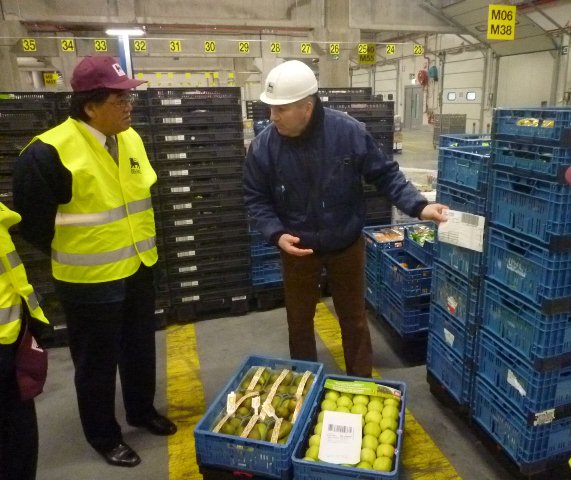 Delhaize started off in 1867 as a small grocery store opened by Jules Delhaize in Charleroi (60km to the south of Brussels) and has grown into a large supermarket chain with 3535 stores worldwide (852 in Belgium and Luxemburg). Delhaize employs 160,000 people worldwide and to my surprise the annual sales revenue amounts to 21.1 billion euro. Its biggest competitor on the market is Colruyt, also from Belgium. Whereas Colruyt is strong in the price competition, Delhaize offers higher quality as a selling point, resulting in one-third of their products (55% of sales) being made in-house. Only 19 Japanese food items are being sold, but three stores in Brussels do sell sushi. Furthermore, there is also another supermarket in Belgium with a similar name, called Louis Delhaize (or Cora depending on the region). This is a completely different company which was established by the brother of Delhaize’s founder in the second half of the 19th century and which is now in French hands. The well-known high-quality food store Rob in Brussels also falls under the umbrella of Carrefour. It seems the competition in the food market between Belgium and France will continue for a while yet. Delhaize started off in 1867 as a small grocery store opened by Jules Delhaize in Charleroi (60km to the south of Brussels) and has grown into a large supermarket chain with 3535 stores worldwide (852 in Belgium and Luxemburg). Delhaize employs 160,000 people worldwide and to my surprise the annual sales revenue amounts to 21.1 billion euro. Its biggest competitor on the market is Colruyt, also from Belgium. Whereas Colruyt is strong in the price competition, Delhaize offers higher quality as a selling point, resulting in one-third of their products (55% of sales) being made in-house. Only 19 Japanese food items are being sold, but three stores in Brussels do sell sushi. Furthermore, there is also another supermarket in Belgium with a similar name, called Louis Delhaize (or Cora depending on the region). This is a completely different company which was established by the brother of Delhaize’s founder in the second half of the 19th century and which is now in French hands. The well-known high-quality food store Rob in Brussels also falls under the umbrella of Carrefour. It seems the competition in the food market between Belgium and France will continue for a while yet.
< Belgium’s Social Clubs >
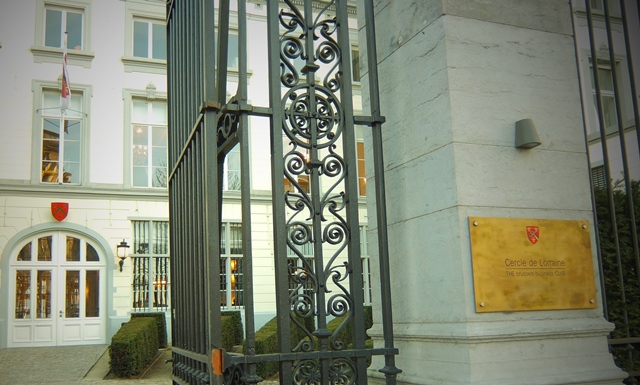 In Belgium, just as in many other Western countries, you have several social clubs with members from the so-called ‘high society’. The Cercle Gaulois in Brussels is a prime example of these clubs. At the end of last month the diplomatic corps (ambassadors) were invited there to a New Year’s reception and over 300 people attended. – The party was a great success. Since its foundation in 1847 the club already has a history of more than 160 years. Men and women came dressed up properly for the night’s gala. At about 9.30 pm dinner was served and past 11.30 pm we moved to a different room to enjoy a cup of coffee. The party broke up late at night after midnight, which seems to be customary. I often frequent the “Cercle of Lorraine”, a membership-based social club that was just established in 1998 and that often invites politicians and famous economists as guest speakers on luncheon meetings. In Belgium’s case, you find these members-only clubs not just in Brussels, but also in big regional cities where local dignitaries attend the social gatherings. It also is common to have separate clubs for the Dutch and French speaking regions. Many clubs have a long history dating back to the 19th century and the aim of ‘discussing the arts and literature’ was stipulated in the club’s charter. The membership requirements for these clubs are quite strict; is it just me who feels the remnants of the glamorous era of Belgium’s class society? In Belgium, just as in many other Western countries, you have several social clubs with members from the so-called ‘high society’. The Cercle Gaulois in Brussels is a prime example of these clubs. At the end of last month the diplomatic corps (ambassadors) were invited there to a New Year’s reception and over 300 people attended. – The party was a great success. Since its foundation in 1847 the club already has a history of more than 160 years. Men and women came dressed up properly for the night’s gala. At about 9.30 pm dinner was served and past 11.30 pm we moved to a different room to enjoy a cup of coffee. The party broke up late at night after midnight, which seems to be customary. I often frequent the “Cercle of Lorraine”, a membership-based social club that was just established in 1998 and that often invites politicians and famous economists as guest speakers on luncheon meetings. In Belgium’s case, you find these members-only clubs not just in Brussels, but also in big regional cities where local dignitaries attend the social gatherings. It also is common to have separate clubs for the Dutch and French speaking regions. Many clubs have a long history dating back to the 19th century and the aim of ‘discussing the arts and literature’ was stipulated in the club’s charter. The membership requirements for these clubs are quite strict; is it just me who feels the remnants of the glamorous era of Belgium’s class society?
< Belgium’s Holiday Fair >
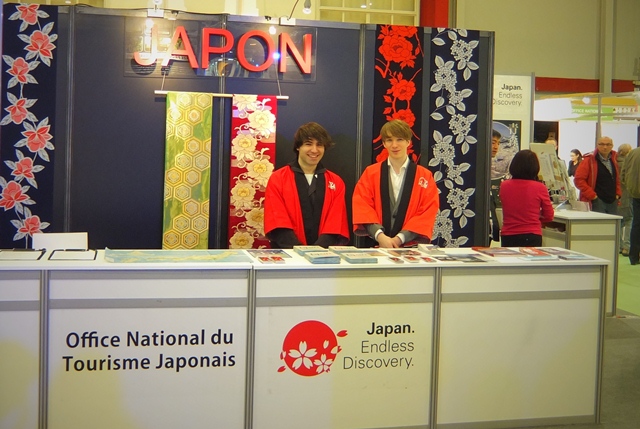 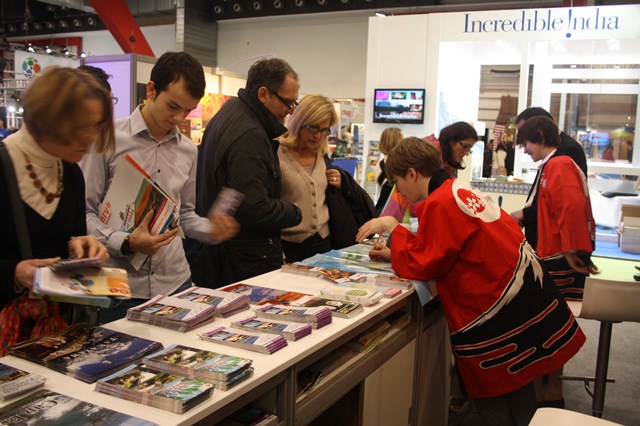 Over the weekend the Salon des Vacances (International Travel Expo) was held at Brussels Expo for five days. It was the 56th expo and was organised by the Switzerland-based (Lausanne) NGO FISA (International Boat Federation). Seventy countries participated this year, setting up 750 booths in the large expo site. More than 100,000 visitors attended the fair over a period of 5 days. Although this year’s “Special Guest Country” was the South-American country Peru, from this year on the organizer was switched to a NGO related to boating, which is why a strong emphasis was put on beach resorts in the Mediterranean and the Caribbean. Working together for the first time, the Japanese National Tourism Office (JNTO) and our Embassy set up a small information booth in the non-European countries-hall, where we received a lot of visitors seeking information on travelling in Japan. However, the booths of other countries had eye-catching decorations on display and handed out goods to attract the visitors. I think we also should refine our plan for next year to attract visitors. Over the weekend the Salon des Vacances (International Travel Expo) was held at Brussels Expo for five days. It was the 56th expo and was organised by the Switzerland-based (Lausanne) NGO FISA (International Boat Federation). Seventy countries participated this year, setting up 750 booths in the large expo site. More than 100,000 visitors attended the fair over a period of 5 days. Although this year’s “Special Guest Country” was the South-American country Peru, from this year on the organizer was switched to a NGO related to boating, which is why a strong emphasis was put on beach resorts in the Mediterranean and the Caribbean. Working together for the first time, the Japanese National Tourism Office (JNTO) and our Embassy set up a small information booth in the non-European countries-hall, where we received a lot of visitors seeking information on travelling in Japan. However, the booths of other countries had eye-catching decorations on display and handed out goods to attract the visitors. I think we also should refine our plan for next year to attract visitors.
< Chateau de Hex in Tongeren >
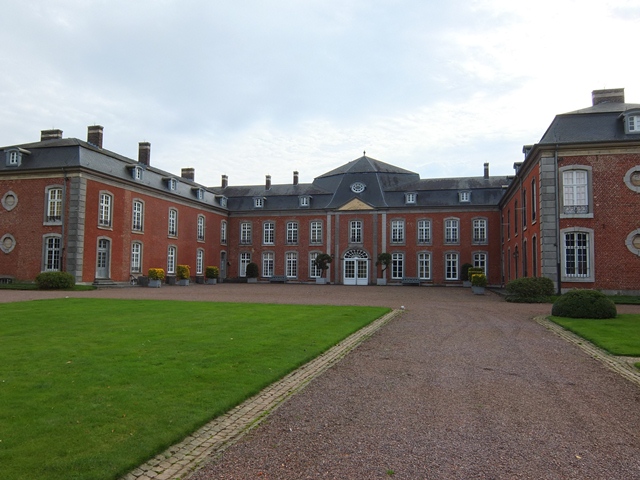 At the end of last year I visited Chateau de Hex located outside the city of Tongeren (85 km to the east of Brussels) – its beautiful appearance left me with a great impression. This castle is the residence of Count Ghislain d’Ursel and was constructed in the second half of the 18th century. Count Ghislain d’Ursel is a descendant of the bloodline of the Prince-Bishop of Liège, lord of a semi-sovereign state which managed to last for 800 years until the French Revolution. He is chairmana board member of the Belgian Association for the Preservation of Castles and Gardens. Several months ago I met Count Ghislain and was invited to Chateau de Hex. There are many vegetable gardens along the castle ground premises, which are opened to the local residents during the weekend. Hunting seems also possible in the surrounding fields and hills and the Count himself keeps outstanding hunting dogs. At the castle we were joined for lunch by a local influential politician. I got a taste of the life of a castle lord when the fireplace was lit and we enjoyed a cup of coffee in the living-room after lunch. There are over 300 castles like this one in Belgium and there are up to 400 lineages of nobility peerage from before the French Revolution. Not unexpectedly I recognize once more that Belgium is really “the Kingdom”. At the end of last year I visited Chateau de Hex located outside the city of Tongeren (85 km to the east of Brussels) – its beautiful appearance left me with a great impression. This castle is the residence of Count Ghislain d’Ursel and was constructed in the second half of the 18th century. Count Ghislain d’Ursel is a descendant of the bloodline of the Prince-Bishop of Liège, lord of a semi-sovereign state which managed to last for 800 years until the French Revolution. He is chairmana board member of the Belgian Association for the Preservation of Castles and Gardens. Several months ago I met Count Ghislain and was invited to Chateau de Hex. There are many vegetable gardens along the castle ground premises, which are opened to the local residents during the weekend. Hunting seems also possible in the surrounding fields and hills and the Count himself keeps outstanding hunting dogs. At the castle we were joined for lunch by a local influential politician. I got a taste of the life of a castle lord when the fireplace was lit and we enjoyed a cup of coffee in the living-room after lunch. There are over 300 castles like this one in Belgium and there are up to 400 lineages of nobility peerage from before the French Revolution. Not unexpectedly I recognize once more that Belgium is really “the Kingdom”.
|

